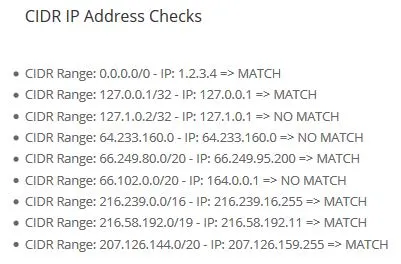这里有一个快速的64位函数来完成它,请注释您不需要的返回行。接受任何有效的Ipv4,带或不带有效的CIDR路由前缀,例如63.161.156.0/24或63.161.156.0。
<?php
function cidr2range($ipv4){
if ($ip=strpos($ipv4,'/'))
{$n_ip=(1<<(32-substr($ipv4,1+$ip)))-1; $ip_dec=ip2long(substr($ipv4,0,$ip)); }
else
{$n_ip=0; $ip_dec=ip2long($ipv4); }
$ip_min=$ip_dec&~$n_ip;
$ip_max=$ip_min+$n_ip;
return [$ip_min,$ip_max];
return [long2ip($ip_min),long2ip($ip_max)];
return [long2ip($ip_min),long2ip(~$n_ip)];
return [long2ip($ip_min),long2ip($n_ip)];
return ++$n_ip;
}
为了快速检查给定的ipv4地址是否匹配给定的CIDR,您可以像这个例子一样将其内联处理
<?php
$given_cidr='55.55.55.0/24';
$given_ipv4='55.55.55.55';
if(($range=cidr2range($given_cidr)) &&
($check=ip2long($given_ipv4))!==false &&
$check>=$range[0] && $check<=$range[1])
{
echo 'Yes, '.$given_ipv4.' is included in '.$given_cidr;
}
else
{
echo 'No, '.$given_ipv4.' is not included in '.$given_cidr;
}
要将给定的IP(包括CIDR路由前缀或不包括)转换成完整的数组,您可以使用以下代码,但要小心,例如25.25.25.25/16会返回一个具有65536个元素的数组,如果使用较小的路由前缀可能会很容易耗尽内存。
<?php
$result=cidr2range($ipv4);
for($ip_dec=$result[0];$ip_dec<=$result[1];$ip_dec++)
$full_range[$ip_dec]=long2ip($ip_dec);
print_r($full_range);
为了快速检查给定的ipv4地址是否与给定的IP数组匹配(无论是否带有CIDR路由前缀),您可以进行以下步骤:
<?php
#This code is checking if a given ip belongs to googlebot
$given_ipv4='74.125.61.208';
$given_cidr_array=['108.59.93.43/32','108.59.93.40/31','108.59.93.44/30','108.59.93.32/29','108.59.93.48/28','108.59.93.0/27','108.59.93.64/26','108.59.93.192/26','108.59.92.192/27','108.59.92.128/26','108.59.92.96/27','108.59.92.0/27','108.59.94.208/29','108.59.94.192/28','108.59.94.240/28','108.59.94.128/26','108.59.94.16/29','108.59.94.0/28','108.59.94.32/27','108.59.94.64/26','108.59.95.0/24','108.59.88.0/22','108.59.81.0/27','108.59.80.0/24','108.59.82.0/23','108.59.84.0/22','108.170.217.128/28','108.170.217.160/27','108.170.217.192/26','108.170.217.0/25','108.170.216.0/24','108.170.218.0/23','108.170.220.0/22','108.170.208.0/21','108.170.192.0/20','108.170.224.0/19','108.177.0.0/17','104.132.0.0/14','104.154.0.0/15','104.196.0.0/14','107.167.160.0/19','107.178.192.0/18','125.17.82.112/30','125.16.7.72/30','74.125.0.0/16','72.14.192.0/18','77.109.131.208/28','77.67.50.32/27','66.102.0.0/20','66.227.77.144/29','66.249.64.0/19','67.148.177.136/29','64.124.98.104/29','64.71.148.240/29','64.68.64.64/26','64.68.80.0/20','64.41.221.192/28','64.41.146.208/28','64.9.224.0/19','64.233.160.0/19','65.171.1.144/28','65.170.13.0/28','65.167.144.64/28','65.220.13.0/24','65.216.183.0/24','70.32.132.0/23','70.32.128.0/22','70.32.136.0/21','70.32.144.0/20','85.182.250.128/26','85.182.250.0/25','80.239.168.192/26','80.149.20.0/25','61.246.224.136/30','61.246.190.124/30','63.237.119.112/29','63.226.245.56/29','63.158.137.224/29','63.166.17.128/25','63.161.156.0/24','63.88.22.0/23','41.206.188.128/26','12.234.149.240/29','12.216.80.0/24','8.34.217.24/29','8.34.217.0/28','8.34.217.32/27','8.34.217.64/26','8.34.217.128/25','8.34.216.0/24','8.34.218.0/23','8.34.220.0/22','8.34.208.128/29','8.34.208.144/28','8.34.208.160/27','8.34.208.192/26','8.34.208.0/25','8.34.209.0/24','8.34.210.0/23','8.34.212.0/22','8.35.195.128/28','8.35.195.160/27','8.35.195.192/26','8.35.195.0/25','8.35.194.0/24','8.35.192.0/23','8.35.196.0/22','8.35.200.0/21','8.8.8.0/24','8.8.4.0/24','8.6.48.0/21','4.3.2.0/24','23.236.48.0/20','23.251.128.0/19','216.239.32.0/19','216.252.220.0/22','216.136.145.128/27','216.33.229.160/29','216.33.229.144/29','216.34.7.176/28','216.58.192.0/19','216.109.75.80/28','216.74.130.48/28','216.74.153.0/27','217.118.234.96/28','208.46.199.160/29','208.44.48.240/29','208.21.209.0/28','208.184.125.240/28','209.185.108.128/25','209.85.128.0/17','213.200.103.128/26','213.200.99.192/26','213.155.151.128/26','199.192.112.224/29','199.192.112.192/27','199.192.112.128/26','199.192.112.0/25','199.192.113.176/28','199.192.113.128/27','199.192.113.192/26','199.192.113.0/25','199.192.115.80/28','199.192.115.96/27','199.192.115.0/28','199.192.115.128/25','199.192.114.192/26','199.192.114.0/25','199.223.232.0/21','198.108.100.192/28','195.16.45.144/29','192.104.160.0/23','192.158.28.0/22','192.178.0.0/15','206.160.135.240/28','207.223.160.0/20','203.222.167.144/28','173.255.125.72/29','173.255.125.80/28','173.255.125.96/27','173.255.125.0/27','173.255.125.128/25','173.255.124.240/29','173.255.124.232/29','173.255.124.192/27','173.255.124.128/29','173.255.124.144/28','173.255.124.160/27','173.255.124.48/29','173.255.124.32/28','173.255.124.0/27','173.255.124.64/26','173.255.126.0/23','173.255.122.128/26','173.255.122.64/26','173.255.123.0/24','173.255.121.128/26','173.255.121.0/25','173.255.120.0/24','173.255.117.32/27','173.255.117.64/26','173.255.117.128/25','173.255.116.192/27','173.255.116.128/26','173.255.116.0/25','173.255.118.0/23','173.255.112.0/22','173.194.0.0/16','172.102.8.0/21','172.253.0.0/16','172.217.0.0/16','162.216.148.0/22','162.222.176.0/21','180.87.33.64/26','128.177.109.0/26','128.177.119.128/25','128.177.163.0/25','130.211.0.0/16','142.250.0.0/15','146.148.0.0/17'];
echo '<pre>';
$in_range=false;
if (($given_ipv4_dec=ip2long($given_ipv4))!==false)
{
foreach($given_cidr_array as $given_cidr){
if(($range=cidr2range($given_cidr)) &&
$given_ipv4_dec>=$range[0] && $given_ipv4_dec<=$range[1])
{
$in_range=true;
echo $given_ipv4.' matched '.$given_cidr.' ('.join(array_map('long2ip',$range),' - ').")\n";
}
}
}
echo $given_ipv4.' is probably'.($in_range?'':' not').' a Googlebot IP';
为了提高速度,该函数不会检查输入,但它应该是一个符合以下正则表达式的字符串。
#^(?:((?:0)|(?:2(?:(?:[0-4][0-9])|(?:5[0-5])))|(?:1?[0-9]{1,2}))\.((?:0)|(?:2(?:(?:[0-4][0-9])|(?:5[0-5])))|(?:1?[0-9]{1,2}))\.((?:0)|(?:2(?:(?:[0-4][0-9])|(?:5[0-5])))|(?:1?[0-9]{1,2}))\.((?:0)|(?:2(?:(?:[0-4][0-9])|(?:5[0-5])))|(?:1?[0-9]{1,2}))(?:/((?:(?:0)|(?:3[0-2])|(?:[1-2]?[0-9]))))?)$#
如果您想在使用函数之前验证输入
<?php
if (is_string($ipv4) && preg_match('#^(?:((?:0)|(?:2(?:(?:[0-4][0-9])|(?:5[0-5])))|(?:1?[0-9]{1,2}))\.((?:0)|(?:2(?:(?:[0-4][0-9])|(?:5[0-5])))|(?:1?[0-9]{1,2}))\.((?:0)|(?:2(?:(?:[0-4][0-9])|(?:5[0-5])))|(?:1?[0-9]{1,2}))\.((?:0)|(?:2(?:(?:[0-4][0-9])|(?:5[0-5])))|(?:1?[0-9]{1,2}))(?:/((?:(?:0)|(?:3[0-2])|(?:[1-2]?[0-9]))))?)$#',$ipv4))
{
#This is a valid ipv4 with or without CIDR Routing Prefix
$result=cidr2range($ipv4);
print_r($result);
}
那么对于你的问题,正式答案如下:
<?php
function cidr_match($mixed_ip,$mixed_cidr){
if (!is_array($mixed_ip)){
$string_mode=true;
$mixed_ip=[$mixed_ip=>0];
}
else $mixed_ip=array_fill_keys($mixed_ip,0);
if (!is_array($mixed_cidr)) $mixed_cidr=[$mixed_cidr];
foreach($mixed_ip as $ip => &$result)
foreach($mixed_cidr as $cidr)
{
if(($range=cidr2range($cidr)) &&
($check=ip2long($ip))!==false &&
$check>=$range[0] && $check<=$range[1]){
$result=$cidr;
break;
}
}
$mixed_ip=array_filter($mixed_ip);
return $string_mode?($mixed_ip?true:false):$mixed_ip;
}
print '<pre>';
$ips = array('10.2.1.100', '10.2.1.101', '10.5.1.100', '1.2.3.4');
foreach ($ips as $IP) {
if (cidr_match($IP, '10.2.0.0/16') == true) {
print "you're in the 10.2 subnet\n";
}
}
$result=cidr_match($ips,['20.2.0.0/16','10.2.0.0/15']);
foreach($result as $ip => $cidr){
print "$ip is in the $cidr subnet\n";
}
您可以使用这些示例编译自己的函数,希望这几行文字能为您提供帮助...
